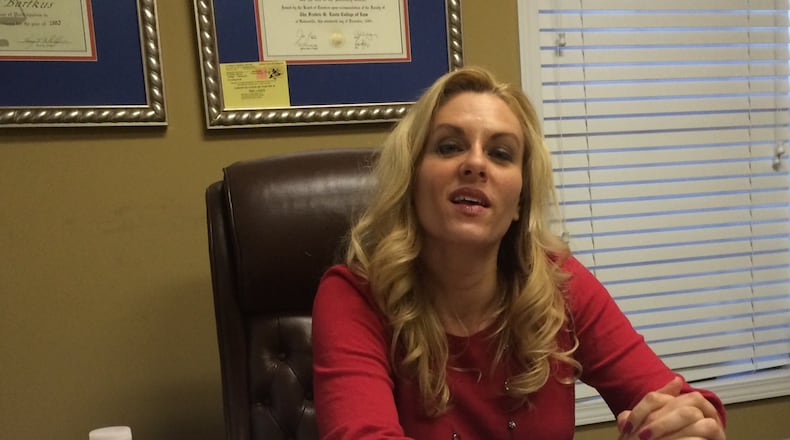A security recording system installed in a Cobb County courtroom, tucked away and largely forgotten, provided a glimpse into how the sausage gets made.
The camera looks down over the judge’s desk and captures workaday minutia like clerks at lunch yakking about lawyers, attorneys playing paper-rock-scissors and the judge and prosecutors in idle conversation that reinforces what many already suspect — judges often see themselves as an arm of the prosecution.
In the recording, Superior Judge Reuben Green, a former Cobb prosecutor himself, seems like a kindly uncle chattingo with two assistant district attorneys. Green talks comfortably with them, giving advice on trial strategy and feeling them out on other cases.
The three talked about a recent case where a guy beat a murder rap after shooting to death his knife-wielding girlfriend. The jury did find him guilty on aggravated assault, and he got 20 years. But he avoided a murder conviction.
“God that was crazy,” said Green, who couldn’t believe jurors failed to convict based on the cop’s testimony, an anomaly in Cobb.
The judge referred to an upcoming armed robbery trial, saying, “Hopefully this jury does the right thing. Had some unusual cases lately. Unusual juries.”
Cobb has changed demographically and it’s unsure what he meant by “unusual.” The judge didn’t call me back.
But, generally speaking, judges should hold an actual trial and hear some evidence before declaring the defendant guilty.
Still, Green needn’t have worried. Cobb is still pretty tough. In the case he wondered about on the tape, an ex-con named Tomdrick Cromer later was convicted of armed robbery and sentenced to life without parole.
I know, I know. I can almost hear you saying, So what? These guys are scumbags!
And you’re right in many of the cases. Many, many of them.
But this episode is being used to get Cromer’s case overturned. Attorney Ashleigh Merchant stumbled upon the recording and is using it as the basis for her appeal, saying the judge acted like a prosecution colleague, not a referee.
I know, I know. So what? These criminal-loving defense attorneys always argue that.
But there is a problem. Cobb courts must retry an old robbery-murder case because the state Supreme Court recently tossed out two murder defendants’ convictions, and a third defendant’s conviction hangs in the balance.
Merchant was an appellate attorney in that one, too. And Green was the judge. The basis for that reversal? The judge’s ties to the district attorney’s office and his failure to recuse himself.
(The DA at the time, Green’s old boss, was his campaign treasurer in a previous judgeship race. Green refused to consider recusing himself and even debated the lawyers who brought it up. That makes judges look hostile and unfair, the Supremes noted.)
You’d figure the good judge might learn to distance himself from his old pals. But it’s hard: prosecutors and judges are often part of the same tribe.
Still, judges aren't supposed to talk to one side about a case without the other side present. It's a big deal in the game, which is what the justice system is. It goes to the basic foundation of fairness and competing interests and the judge being an impartial observer. Appearances are reality.
Stephen Bright, president of Southern Center for Human Rights and veteran trial lawyer, said, “This kind of activity goes on every day all over Georgia. The difference here was there was a recording.
“But this goes beyond the pale,” Bright said. “It’s like the umpire going into the dugout to be the coach. I think he should resign. If he wants to be a prosecutor, then go back to the prosecutor’s office.”
Vic Reynolds, Cobb’s DA, says people often see judges coming from the prosecution ranks and say “how in the world can they be fair? All they have done is prosecute people.
“But I have seen the majority of former prosecutors who become prosecutors make a double effort to bend over backwards to be fair,” said Reynolds, who was a cop, prosecutor, judge, defense attorney and now the DA.
J. Tom Morgan, the former DeKalb County DA and now a defense attorney, said, “Most judges are pro-prosecution because that’s the pool they came from. Prosecutors are groomed on that path. A judge is the next step.”
In essence, the prosecutorial ranks are AA ball for the Major Leagues of judgedom. Judicial gigs are great jobs — you wear robes during the day and everyone sucks up to you.
Morgan added that while Green “rules with the prosecution most of the time, I don’t think he’d gut a defense case.”
I think he meant he wouldn’t gut the defense case just for the heck of it.
But defense attorneys complain Green often guts cases and he is widely known as being Tough on Crime, which is a badge of honor, certainly in Cobb and in most circuits in Georgia. Being fair is good. Being hard-nosed is better, when it comes to electability. Heck, Judge Green could even use the videotape in his campaign literature.
And that leaves Ashleigh Merchant, the lawyer who started it all. She is becoming known as a legal agitator, which makes changes for the good happen. But it’s not necessarily a great career move in the clubby land of criminal justice.
“I’m a wreck about this,” she said. “I’m definitely sticking my neck out. I’m worrying about being hurt professionally. And I haven’t broken any rules.”
Except the one that says don’t stick your thumb in the eye of a judge where you practice. But it keeps the system honest.
About the Author
The Latest
Featured

